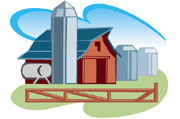Bulletin #2364, Maine Farm Safety Program: Notes on Preplanning for Safety

Bulletin #2364, Maine Farm Safety Program: Notes on Preplanning for Safety (PDF)
By Dawna L. Cyr, Farm Safety Project Assistant, and Steven B. Johnson, Ph.D., Extension Crops Specialist
For information about UMaine Extension programs and resources, visit extension.umaine.edu.
Find more of our publications and books at extension.umaine.edu/publications/.
Don’t wait for an accident to happen. Here are five things to make part of your everyday routine:
- Focus on the present task. How well are you concentrating? Boredom or exhaustion can lead to slips.
- Take time to do the job right. It takes a little longer to put on the extra protective equipment, but it may prevent a painful injury. Are you managing your time well? Make a list, number the jobs most important to least important. This way you will know you are doing the most important things and are less likely to rush.
- Have the strength to do what is right. Don’t get caught up in taking shortcuts or fooling around.
- Take responsibility even when a certain task “isn’t your job.” Care about yourself and others. Be part of the team.
- There’s no way to avoid ALL risks, but you can weigh the risks of doing a job in a certain way. Even if there is a one in a thousand risk, it’s not worth it.
- Maintain a safety attitude.
- Be your own safety director.
- Assess risks on your own farm.
Be Your Own Safety Director
Since farmers are their own bosses, they also must be their own safety directors. The agriculture safety record of the 1990s could be greatly improved if farmers would take fewer risks. The National Safety Council recommends the following tips to help reduce risks on farms and ranches:
- Make accident prevention a management goal. Realize that you are responsible for safety and health instruction.
- Reduce your risk of injury and illness with prevention. Read and follow instructions in the operator’s manuals and product labels and use personal protective equipment,
- Conduct routine hazard checks of equipment, buildings, and grounds. Correct problems immediately, and avoid hazards that can’t be eliminated.
- Instruct employees and family workers on the proper way to do their jobs and to take care of their health, both on and off the job.
- Do what is necessary to protect children, the elderly and others in your care.
- Prepare for each activity. Keep fit, respect your limitations and seek proper care for health problems.
How to Assess Risks
Here are four questions that can help you assess the risks on your farm.
- What are the hazards?
- Who’s at risk?
- What are the current preventative measures?
- Can anything further be done?
This Maine Farm Safety fact sheet is part of an educational fact sheet series produced by University of Maine Cooperative Extension. For more information on farm safety, contact your UMaine Extension County Office.
Information in this publication is provided purely for educational purposes. No responsibility is assumed for any problems associated with the use of products or services mentioned. No endorsement of products or companies is intended, nor is criticism of unnamed products or companies implied.
© 2003
Call 800.287.0274 (in Maine), or 207.581.3188, for information on publications and program offerings from University of Maine Cooperative Extension, or visit extension.umaine.edu.
In complying with the letter and spirit of applicable laws and pursuing its own goals of diversity, the University of Maine System does not discriminate on the grounds of race, color, religion, sex, sexual orientation, transgender status, gender, gender identity or expression, ethnicity, national origin, citizenship status, familial status, ancestry, age, disability physical or mental, genetic information, or veterans or military status in employment, education, and all other programs and activities. The University provides reasonable accommodations to qualified individuals with disabilities upon request. The following person has been designated to handle inquiries regarding non-discrimination policies: Director of Equal Opportunity and Title IX Services, 5713 Chadbourne Hall, Room 412, University of Maine, Orono, ME 04469-5713, 207.581.1226, TTY 711 (Maine Relay System).

